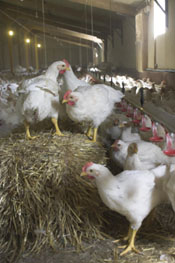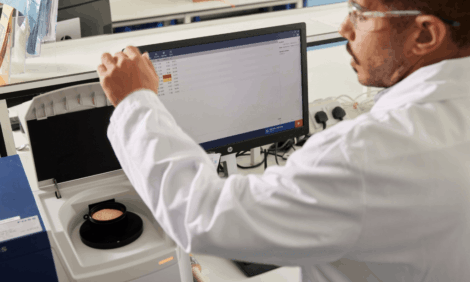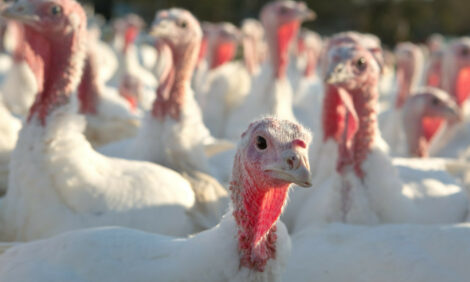



What is Behind Welfare Friendly Production?
By Chris Harris, Senior editor of ThePoultrySite. The debate between extensive and intensive poultry farming has come under close public scrutiny in recent weeks. |
| Freedom Foods - an assurance scheme not a method of production. |
In the UK, in particular, rearing methods have been examined, criticised, applauded and extolled following their examination by three high profile celebrity chefs - Jamie Oliver, Hugh Fearnley Whittingstall and Gordon Ramsay.
Intensive rearing methods have also been the target for campaigns by several animal welfare organisations, including Compassion in World Farming and the Royal Society for the Prevention of Cruelty to Animals.
How birds are kept not only for meat but also for egg production has also come under the scrutiny of authorities worldwide, with the European Commission in the last week confirming a ban on battery cages for laying hens by 2012.
All along the line, the proponents of extensive farming regimes have called for rearing methods such as free-range to be the best method of production.
However, the specifics of what free-range means can vary from area to area and country to country.
Even intensive farming methods have their practices controlled by legislation to ensure the welfare of the animals, so there can be confusion for the producer over what are the best rearing and raising methods to produce the best quality products under the correct welfare standards.
Different countries have different standards and a variety of assurance schemes that ostensibly tell the consumer what the welfare conditions are under which the animals have reared.
One such standard that has been talked of a lot in the UK following the recent celebrity chef TV campaign for welfare friendly conditions for broilers is the Freedom Food standard.
Freedom Food is a farm assurance and food labelling scheme that was established by the RSPCA in 1994 to improve farm animal welfare and to address growing consumer demand for higher welfare produce.
The Freedom Food label is designed to enable shoppers to recognise higher welfare products - products that come from animals reared on farms inspected to strict RSPCA welfare standards, with assured traceability from farm to fork.
Farm Assurance with a Difference
The RSPCA says that Freedom Food is the only farm assurance scheme in the UK with improved welfare as its primary goal, and is completely independent from the food industry.
* Freedom Foods is not a production system, it is an assurance scheme and we do not restrict ourselves to any one system |
|
Mark Cooper RSPCA senior scientific officer
|
All the members of the scheme are assessed according to RSPCA species-specific welfare standards.
The RSPCA says the standards are mandatory, but deliberately practical and achievable for both small and large scale farms.
The standards were developed by the RSPCA farm animals department and take into account advice from welfare academics, veterinary specialists, and practical experience from the farming industry. Freedom Food is UKAS accredited to EN 45011.
However, the scheme is not a production method in itself and it is not the sole preserve of free range production or organic production. It also covers welfare practices for more intensive barn rearing production methods.
"Freedom Foods is not a production system, it is an assurance scheme and we do not restrict ourselves to any one system," said RSPCA senior scientific officer, Mark Cooper.
Who Can Join?
Farmers, hauliers, abattoirs, processors and packers can join the scheme, providing the RSPCA welfare standards are met. It is an assurance system that covers poultry production from the birth of the bird through to slaughter.
A Freedom Food approved assessor visits everyone, who applies for membership and completes a thorough audit of their premises.
The assessors all have practical experience in the agricultural industry. The standards are set down based on science and reviews once or twice a year by an independent panel of researchers, scientists, vets and industry representatives. There are currently over 2,200 Freedom Food members.
Members are re-inspected once a year, and may also receive a visit from one of the RSPCA farm livestock officers (FLO's), who carry out annual spot checks on a minimum of 30 per cent of the membership.
The RSPCA also carries out spot checks at stores, taking poultry products that have been marked with the Freedom Foods label and checking back on the production chain to ensure that every step has been through Freedom Food approved systems.
If a member fails to comply with the rules of the scheme, their membership is withdrawn.
In addition, regular traceability checks are carried out, from supermarket shelf right back to the farm, to ensure that everyone involved in the production of Freedom Food labelled products has been approved by the scheme.
Higher Welfare Chicken
The RSPCA says that the Freedom Food farm assurance and food labelling scheme helps to improve welfare standards for the one billion farm animals reared for food each year in the UK.
The scheme lays down specific standards for each step of production from the hatchery to the slaughterhouse.
 |
| Stocking density, environmental enrichment and light are essential standards for indoor reared Freedom Food chickens |
If the farmer is using an indoor methods of production, the standards lay down the stocking densities for the birds, the amount of light they have, it requires that the should be environmental enrichment in the barns to allow the birds to move around and perch and it also designates that the birds should be slower growing than some of the intensively farmed breeds, restricting growth to 45 grams a day. The stocking density allows the birds about 25 per cent more room than the industry standard for intensively reared birds.
Rebecca Ralph from the RSPCA said: "The lighting levels have to be 10 times brighter than the industry standard and by 2010 there will have to be natural lighting in the sheds."
To ensure that the assurance scheme operates along the chain the onus is on each member of the chain to establish that the birds they take come from a Freedom Food approved operation.
Cost and Returns
The cost of the scheme to the producer depends on the size of the operation and although it adds cost to production, according to Mr Cooper, it has production benefits that add value.
He said that research had shown that the Freedom Food standards had helped to reduce foot pad burn on birds by 50 per cent compared to intensively reared birds, hock burn had been reduced by 80 per cent and mortality had been reduced by 65 per cent.
He added that the Freedom Food assured systems found there was a 70 per cent reduction in deaths on arrival at the slaughterhouse and a 16 per cent reduction in the number of slaughterhouse rejects. In all the number of grade A birds also increased by 26 per cent.
"While some people might say that Freedom Foods is going to cost them money, they never see the savings," said Mr Cooper.
 |
| Producing better quality birds with higher returns. |
He said that although there might be lower stocking densities and there might be some extra cost, the better quality of the birds produced and the fewer deaths and rejects mean that the producers can make more money.
The celebrity chef Jamie Oliver has backed the scheme and the RSPCA campaign over welfare conditions for poultry.
In support of the scheme he said: "I fully support the RSPCA's campaign asking retailers to stop selling standard chicken by 2010 and I would like more people, if they can afford it, to choose higher welfare labels like Freedom Food, free-range and organic as these mean the birds have had a better life. It's also important to buy British to support our farmers."
Further Reading
|
|
- See the Freedom Foods code of Welfare Standards by clicking here. |
January 2008











